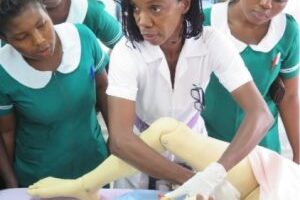Nursing in Ghana
Written by Prince Assandoh-Mensah in 2019
Nursing, since its inception has developed to be one of the most essential professions ever to exist among mankind. With the basis mandate of providing care and support, nurses take up diverse roles to prevent, maintain and promote the health of the community.
In Ghana, nursing is one of the thriving careers and remains a major contributor to the country’s economic and health system. A registered nurse in Ghana may work as a clinical nurse, community health nurse, lecturer or a researcher.
Clinical nurses work in hospitals, clinics and health centres, playing a pivotal role in the healthcare team. They serve as primary caregivers, care managers, patient’s advocates and also take many other roles. Community health nurses may work as home health care providers, health promoters or health educators. Nurse tutors or lecturers provide training to nurses in nursing training institutions whereas nurse researchers work with research institutions, schools and hospitals to provide extensive research in nursing.
The basic nursing education in Ghana is a 3-year diploma course after which trainees receive diploma in nursing, midwifery, community health nursing or mental health nursing. These programs are often run by nursing training colleges that spread across the country. Entry into nursing educational institutions is usually in August but quite recently, a number of institutions also admit in February.
A 4-year nursing education program is also run by universities across the country. Graduates who complete these institutions receive a bachelor’s degree in nursing, midwifery and community health nursing or at times with a specialty in areas such as paediatrics or mental health.
Those with a diploma in nursing can take either 2years or 3years education in the universities to receive a bachelor’s degree.
The Nursing and Midwifery Council of Ghana is the regulatory body that monitors, enlists and regulates the activities of nurses and midwives in Ghana. The core mandate of the council is to secure in the public interest the highest standards of training and practice of nursing and midwifery.
To practice as a nurse in Ghana, one must write and pass a nursing licensure exams organized by the Nursing & Midwifery Council of Ghana. Nurses who have passed the licensure exams are also required to engage in continuous education (continuous professional development) in order to renew their license annually.
There are several professional associations in Ghana that seeks to promote the welfare of their members. Key among them is the Ghana Registered Nurses & Midwives Association (GRNA) and the Ghana Registered Midwives Association (GRMA).
Currently, the government is the major employer of nurses in Ghana. In 2015, the government had about 38,228 nurses on their payroll. However, with the emergent of several health institutions and organizations, the private sector also employs a substantial number of nurses in Ghana.
Reference





1 Comment
cialis in las vegas cialis generic cialis fedex